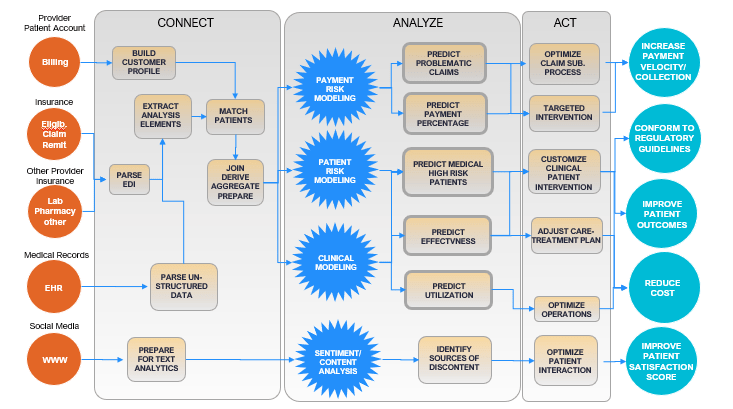Healthcare Analytics Improve Operational Efficiency
Actian Corporation
April 6, 2020

Healthcare is a data-driven industry with data analytics needs that make “big data” seem tiny. For healthcare companies to operate efficiently, they need a high-power data engine to crunch the numbers, analyze the data, and get it into the hands of decision-makers quickly. The healthcare industry is the epitome of business agility, and data analytics is what makes that possible. Here are four examples of how healthcare analytics can help healthcare companies improve operational efficiency.
Healthcare Analytics for Diagnosis and Patient Care
If a patient walks into a clinic with a fever, dry cough, and respiratory symptoms, do they have seasonal allergies that require some antihistamine and a box of tissues or do they have a highly contagious disease like COVID-19 requiring quarantine?
To enable the clinic to diagnose and treat the patient effectively, they need the ability to combine the observations being made with this patient against available information from other providers around the world. They also need to follow guidelines from government organizations, research from drug companies, and many other sources to systematically work through a diagnostic process and determine what the patient’s real problem is and how best to care for them. Healthcare analytics, running behind the scenes at the clinic, in healthcare networks, and in government organizations provide clinicians with the tools they need to do their job effectively.
The diagram below provides a glimpse of how disparate data sources feed the healthcare analytics systems that are used to improve operations and outcomes:

Hospital Operations
Hospitals are massive logistics operations with lots of moving parts. From staffing to patient scheduling to stocking of drugs and supplies, ensuring these operations run smoothly requires high-power data analytics. How many nurses are needed for next Tuesday’s day shift? Are there ICU beds available to handle post-operative care for the people undergoing surgery tomorrow? Does the hospital have enough ventilators and beds to treat COVID-19 patients in addition to the typical patient load? Does the hospital blood bank have enough supply on hand to support the demand for the next couple of weeks?
These are the real questions that hospital administration and operations staff need to answer every day. The answers to these questions come from careful analysis of past trends, current stock levels and patient loads, seasonal forecasts of demand, and modeling of potential “unexpected events.” Failure isn’t an option. You can’t just say to a patient, “I’m sorry, we’re temporarily out of stock of ventilators, but don’t worry, we’ll have more in next month.” Healthcare doesn’t work that way. Healthcare companies use data analytics to plan for the unknown so they can be adequately prepared.
Clinical Trials
The development of new drugs, medical devices, and treatment procedures is a collaborative effort between manufacturers, CROs, healthcare providers, and governmental organizations. Clinical trials are a necessary part of the healthcare process to ensure the safety and efficacy of medical care. Clinical trials involve robust data collection and protocol adherence to ensure the confidence of the results and data that are produced. Data analytics plays an essential part in the clinical trial process. It is used to aggregate data being collected in the trial to analyze and interpret findings and share results with the stakeholders participating in the clinical trials. Data analytics are also employed to investigate adverse reactions, isolate testing anomalies, and quantify the risks of new procedures, drugs, and devices.
Insurance Claim Processing
Processing insurance claims accurately and claims accuracy efficiently leads to higher reimbursement rates and faster payments to hospitals and providers. For small clinics and independent providers, efficient claims processing with insurance companies is essential for maintaining cash flow to keep your business operating. For hospitals and large organizations, the complexity of reconciling the activities taking place over many departments with claims approval and processing spanning multiple insurance companies can be a logistical nightmare.
What do all healthcare companies have in common? Frustration. Data integration and analytics can help healthcare providers to improve their claims processing accuracy and reduce the processing time. Automating the flow of data and performing real-time analysis on patient records to identify potential errors and issues in the insurance reporting process so they can be addressed at the time of treatment instead of needing to be reconciled and fixed days (or months) later.
If you want to do healthcare analytics right, you will need a high-power analytics engine designed for the scale, speed, and performance that the healthcare industry demands. Actian Data Platform provides the analytics capabilities healthcare companies need at an enterprise scale at an affordable price. To learn more about Actian’s solutions for the healthcare industry, visit https://www.actian.com/solutions/by-industry/healthcare/
Subscribe to the Actian Blog
Subscribe to Actian’s blog to get data insights delivered right to you.
- Stay in the know – Get the latest in data analytics pushed directly to your inbox.
- Never miss a post – You’ll receive automatic email updates to let you know when new posts are live.
- It’s all up to you – Change your delivery preferences to suit your needs.